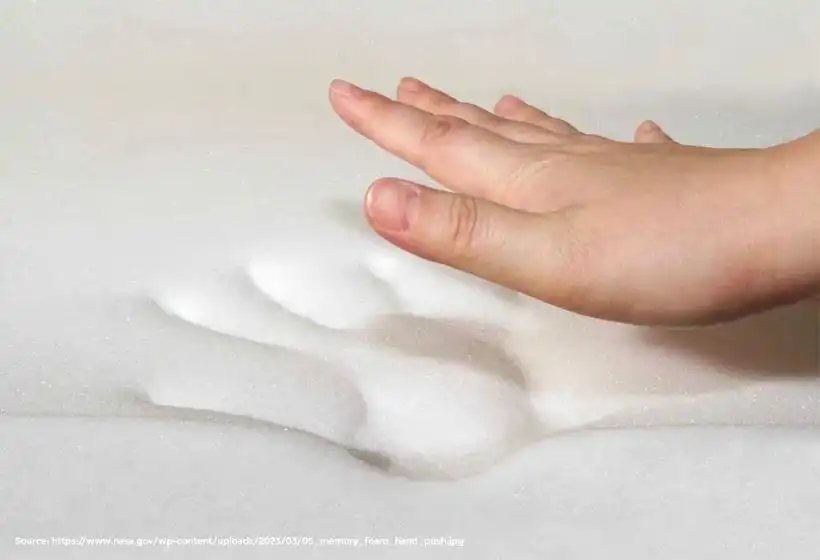Why Do Memory Foam Mattresses Make You Sweat?

As someone who enjoys sinking into the plushness of a memory foam mattress, I can vouch by its comfort. The way it contours to my body, gently providing pressure relief to my sore joints is delightful.
But there’s a catch— I am a hot sleeper, and my memory foam mattress often leaves me feeling like I’ve woken up to a sauna.
The Heat Trap: You see, memory foam mattresses retain heat that leads to sleep disruptions.
But why? Let me break it down for you.
Again, there are a number of memory foam mattresses in the market. I’ll be enlisting cooling gel memory foam mattresses here to give you a head start. In addition, you can buy a memory foam mattress of your choice by keeping an eye on our Best Time to Buy a Mattress page.
Why Do Memory Foam Mattresses Make You Sweat At Night?
Memory foam unlike traditional innerspring mattresses, it is said to reduce back pain and other aches by making sure no part of your body is under too much pressure.
Did You Know?
What you might not know is that this innovative material was originally developed by NASA in the 1960s. The space agency created memory foam to improve the safety of aircraft cushions, seeking a material that could absorb shock and enhance comfort for astronauts during takeoff and landing.
The viscoelastic properties of memory foam made it ideal for this purpose, as it could contour to the body, distribute weight evenly, and return to its original shape.
So, when you sleep on a memory foam mattress, you’re benefiting from a material that was literally designed for astronauts.
But after sleeping on my memory foam mattress for a few days, I started to suffer from night sweats. You guys may also be wondering: “Why do memory foam mattresses make you sweat while sleeping?”
Let me dive into why this happens and what you can do about it.
Do memory foam mattresses make you hot at night?
I’ll discuss on some questions here, and answer them.
1. “Why do I find my memory foam mattress too hot at night?”
If you feel like your memory foam mattress is too hot to sleep on, this one’s for you. We’ve just explained that memory foam absorbs heat, but it’s what happens next that causes your problems.
- Memory foam is made from a synthetic material known as viscoelastic polyurethane foam. This material is highly dense and non-breathable, which means it tends to trap heat.
- When you lie down on a memory foam mattress, it absorbs your body heat and molds to your shape, providing excellent support.
- However, this very characteristic also leads to the mattress reflecting your body heat back to you, causing you to gradually get hotter as the night progresses.
Even a slight increase in your body temperature can disrupt your sleep.
2. “Why am I facing sleep disruptions, and waking up sweaty?”
If you’ve been waking up drenched in sweat and dealing with disrupted sleep, you’re not alone. Night sweats can be quite bothersome and can have various causes. As your body heats up, your skin produces sweat in an attempt to cool it down. This is normal.
But for some people, the amount they sweat can be excessive. In fact, it is thought that 2-3% of the population suffers from night sweats, leaving them waking up with soaked bed clothes even on a cool night.
3. “I sleep warm, and my memory foam mattress makes my night sweats worse”
I’ve always slept warm, but ever since switching to a memory foam mattress, my night sweats have become unbearable.
If you’re experiencing the same problem as me, you’re not alone. Night sweats can seriously disrupt your sleep, leaving you feeling exhausted in the morning. Memory foam mattresses may actually be contributing to your sleepless nights.
But why does this happen and what you can do about it?
First off, it’s normal to toss and turn at night. In fact, on average, we move about 70 times during sleep. Normally, these movements wouldn’t wake us.
However, when you’re sleeping on memory foam that has molded to the shape of your body, it requires a lot more energy to roll over. Your body will have created an indentation in the mattress, so you effectively have to roll up a small hill to get out of it and create a new one.
This extra effort can bring you out of deep sleep each time you move causing sleep disruptions and leaving you feeling tired in the morning.
4. “What factors should I lookout for to avoid night sweats?”
Here are some factors to consider if you’re looking to avoid night sweats:
- Mattress Material

The type of mattress you sleep on plays a significant role in night sweats. Mattresses made from synthetic materials like polyurethane foam can trap heat, making it difficult for your body to regulate its temperature. Memory foam mattresses, in particular, are known to retain heat. They rely on body heat to mold to your shape and provide support, but this very characteristic can lead to excessive sweating. If you experience night sweats, it might be worth reconsidering your mattress. Opt for natural materials or mattresses designed to enhance airflow and dissipate heat.
- Room Temperature and Humidity
The environment of your bedroom significantly impacts your likelihood of experiencing night sweats. A warm or hot bedroom can lead to excessive sweating while you sleep. Your body naturally goes through temperature changes during the night, and a warmer environment can exacerbate this. Make sure your bedroom is cool and well-ventilated. Use fans, air conditioning, or breathable bedding to help maintain a comfortable sleeping temperature. Avoid heavy blankets and opt for lighter, moisture-wicking materials.
- Medications
Certain medications can lead to night sweats as a side effect. Antidepressants and other psychiatric medications are commonly associated with excessive sweating at night. Fever-reducing medications like aspirin can also trigger night sweats. If you suspect your medications might be causing night sweats, consult with your healthcare provider. They may be able to adjust your dosage or switch you to a different medication that doesn’t have this side effect.
- Hormonal Changes
Hormonal imbalances can lead to excessive sweating during sleep. Conditions like diabetes and elevated blood sugar levels can affect your body’s ability to regulate temperature. The hypothalamus, the part of the brain that controls body temperature, can become dysregulated due to hormone issues, leading to night sweats. If you suspect hormonal changes are causing your night sweats, it’s important to speak with a healthcare professional to address the underlying issue.
- Menopause
Menopause is a common cause of night sweats in women. During this time, significant changes in hormone levels, particularly estrogen and progesterone, can trigger hot flashes and night sweats. These hormonal shifts can make regulating body temperature more challenging, leading to excessive sweating. If you’re experiencing menopause-related night sweats, there are treatments and lifestyle changes that can help manage these symptoms.
- Infections
Infections that cause a fever can also lead to night sweats. This includes common illnesses like the flu or more serious conditions like tuberculosis. The body’s response to infection often involves raising the temperature to fight off pathogens, which can result in night sweats. If you have persistent night sweats and other symptoms of infection, seek medical advice to address the underlying cause.
- Stress and Anxiety
Stress and anxiety can trigger night sweats. Panic attacks, nightmares, and general anxiety can cause your body to sweat excessively while you sleep. If you suffer from frequent nightmares or have a condition like PTSD, this can increase your chances of experiencing night sweats. Managing stress through relaxation techniques, therapy, and lifestyle changes can help reduce the occurrence of night sweats.
How To Stop Sweating On Memory Foam Mattress?

So, you’ve identified that your memory foam mattress gets too hot and could be causing your interrupted sleep.
The good news? All is not lost – there’s no need to replace your mattress, and buy a new one just because your bed is too hot.
Although replacing your mattress is one option that could eliminate the problem, it’s not the only solution. If you do decide to replace your mattress, make sure to choose one made from natural or breathable fibers rather than synthetics to avoid overheating.
But if you’d rather not spend on a replacement at the moment, here are a few suggestions from my end.
1. Use a Cooling Mattress Topper
One of the most effective ways to mitigate heat retention in a memory foam mattress is by using a mattress topper to stop sweating. These toppers are designed to enhance airflow and wick away moisture, helping to keep you cool throughout the night.
A cooling gel memory foam mattress topper, in particular, can provide the contouring support of memory foam while also dispersing heat more effectively than traditional memory foam.
2. Enhance Room Ventilation
Keep your room as cool as possible by leaving a window open or running a fan. This simple step can significantly reduce your body heat and prevent your mattress from getting too hot.
Additionally, using an air conditioner or a dehumidifier can help control the temperature and humidity levels in your bedroom, creating a more comfortable sleep environment.
3. Cool Down Before Bed
Take a cool shower before going to bed to lower your body temperature. This can help you start the night feeling cooler, which can reduce the likelihood of overheating as you sleep. Again, using a cold pack or a damp, cool cloth on pulse points like your wrists or neck can provide quick relief from heat.
4. Consider a Cool-Gel Memory Foam Mattress
If you decide that it’s time to replace your mattress, but don’t want to leave the comfort of memory foam, choose a cool-gel memory foam mattress. These mattresses incorporate gel particles or layers within the memory foam that help dissipate heat more effectively than traditional memory foam.
This can provide the contouring support you love without the excessive heat buildup, leading to a cooler, more comfortable sleep experience.
To learn more about cooling-gel memory foam mattresses, read our guide.
Best Mattresses For Night Sweats
To help you make an informed decision, I’ve compiled a list of the best mattresses for night sweats. These mattresses will surely keep you cool and comfortable throughout the night.
1. Tempur-Pedic TEMPUR-Adapt® + Cooling Topper
Tempur-Pedic TEMPUR-Adapt® + Cooling Topper is a fair choice for those who experience night sweats. This mattress topper is designed with a cooling cover that helps dissipate heat and keep you cool throughout the night. The TEMPUR material provides adaptive support and comfort, contouring to your body while preventing heat buildup. The cooling cover is removable and washable, making it easy to maintain a fresh and cool sleeping surface.
Key Features
- Cooling cover for heat dissipation
- TEMPUR material for adaptive support
- Removable and washable cover
2. Casper Snow Mattress
Casper Snow Mattress is renowned for its exceptional cooling properties, making it an ideal choice for individuals who experience night sweats or sleep hot.
Key Features
- Its Snow Technology is specifically designed to keep you cool throughout the night.
- This mattress features a top layer of AirScape™ foam to promote airflow and dissipate heat effectively.
- Casper Snow Mattress includes gel-infused memory foam to further enhance its cooling capabilities.
- In addition to its cooling foam layers, Casper Snow comes with a breathable cover that promotes airflow.
3. Saatva Loom & Leaf Mattress
The Saatva Loom & Leaf Mattress is another great option for those who suffer from night sweats. This mattress features a gel-infused memory foam layer that helps dissipate heat and keep you cool.
The breathable organic cotton cover enhances airflow, while the high-density foam base provides excellent support and durability. Loom & Leaf mattress is available in two firmness options, making it suitable for different sleep preferences.
Key Features
- Gel-infused memory foam for heat dissipation
- Breathable organic cotton cover
- High-density foam base for support and durability
- Available in two firmness options
What Else Can I Do?
6 Tips to Prevent Night Sweats While Sleeping
So, what can you do if you love the comfort of memory foam but don’t want to wake up in a pool of sweat?
Here are a few tips that have helped me.
1. Tip 1: Look for Gel-Infused Memory Foam
Some memory foam mattresses are infused with gel beads designed to absorb and dissipate heat. Gel-infused memory foam can help keep the mattress cooler than traditional memory foam.
2. Tip 2: Invest in a Cooling Mattress Topper
Adding a cooling mattress topper can provide a barrier between you and the heat-retaining memory foam. Look for toppers made from breathable materials like latex or those that have cooling gel infusions.
3. Tip 3: Choose Breathable Bedding
Natural materials like cotton and linen are more breathable than synthetic materials, helping to wick away moisture and keep you cooler. Consider investing in moisture-wicking sheets and a breathable mattress protector.
4. Tip 4: Use a Fan or Air Conditioning
Sometimes, simple solutions like using a fan or turning on the air conditioning can make a big difference in regulating your sleep temperature.
5. Tip 5: Stay Hydrated
Drinking plenty of water throughout the day can help regulate your body temperature and reduce the likelihood of night sweats.
6. Tip 6: Adjust Your Sleepwear
Opt for lightweight, breathable pajamas. Natural fabrics like cotton can help you stay cooler compared to synthetic materials.
If you ask me, I’d advice you take these proactive steps. This will help you enjoy the benefits of memory foam without the discomfort of night sweats.
Personally, I’ve found that making a few adjustments to my sleep environment has made the difference.
If you were wondering, why is my memory foam mattress too hot? Hopefully I’ve answered your questions and given you some useful tips.
In essence, you’ve learnt how memory foam mattresses make you sweat due to their heat-trapping synthetic materials. You need to consider some factors like room temperature and personal health before buying a new mattress.
To mitigate sweating, consider cooling mattress toppers, proper ventilation, hydration, breathable bedding, and alternative mattress materials if needed. This can create a cooler, more comfortable sleep environment for you to get some well-deserved sleep.
For more advice on sleeping better, visit our Mattress Guide.
[Disclaimer: No memory foam mattresses were harmed in the making of this blog.]
